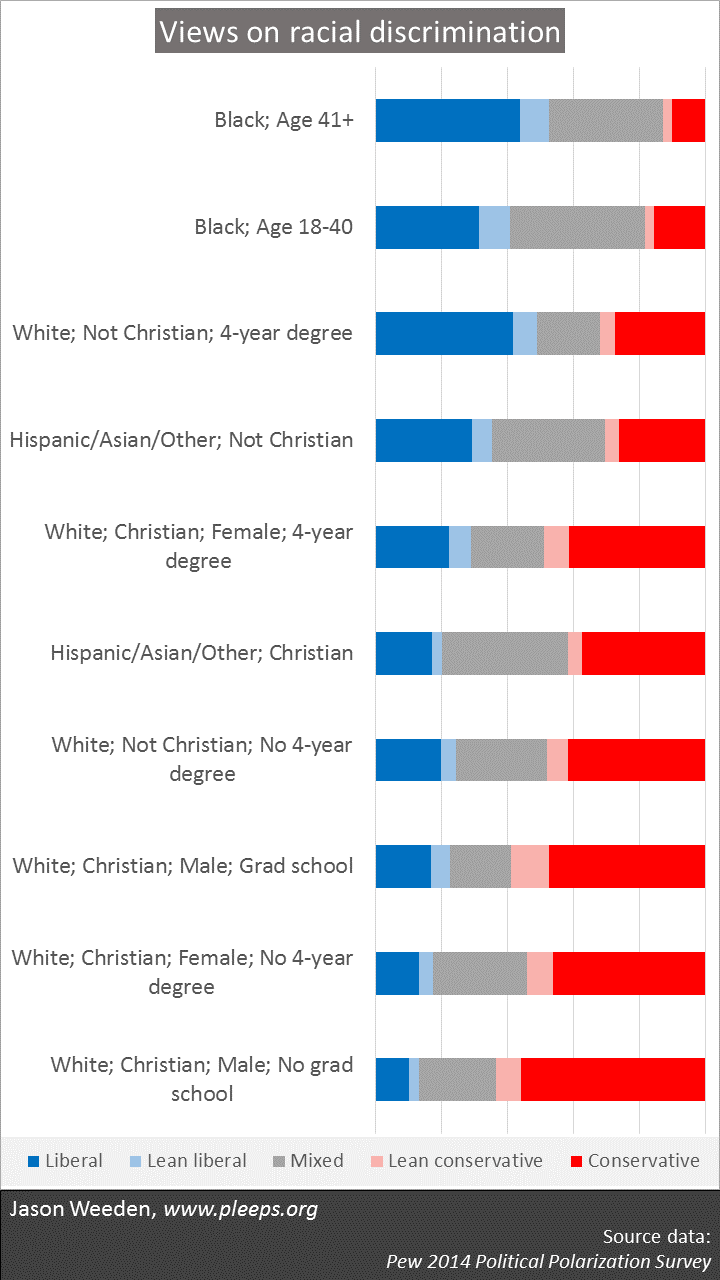The Pew polarization study included two key opinion items on race. One asked respondents to choose between these two statements: (1) Racial discrimination is the main reason why many black people can’t get ahead these days; or (2) Blacks who can’t get ahead in this country are mostly responsible for their own condition. The other asked for a choice between: (1) Our country needs to continue making changes to give blacks equal rights with whites; or (2) Our country has made the changes needed to give blacks equal rights with whites. Overall, around 21% gave liberal responses on both and 40% gave conservative responses on both.
The demographic breakdown of these items involves major roles for race, religion, and education. The chart below shows the sample split into various groups.
 (Technical notes: The total sample size is 10,013. Responses are weighted. “Liberal” means people who selected the liberal response on both items (and the reverse for “conservative”), the “mixed” folks went one way on one and the other on the other (or had no opinion on either), and the “leans” are smaller categories where people answered one item but were neutral on the other. “White” is non-Hispanic white.)
(Technical notes: The total sample size is 10,013. Responses are weighted. “Liberal” means people who selected the liberal response on both items (and the reverse for “conservative”), the “mixed” folks went one way on one and the other on the other (or had no opinion on either), and the “leans” are smaller categories where people answered one item but were neutral on the other. “White” is non-Hispanic white.)
Surprising exactly no one is the fact that blacks’ views on racial discrimination and equality are substantially more liberal on the whole than the views of whites, with Hispanics/Asians/others in the middle. One of the lesser-known additional details is that there is a significant age difference among blacks—younger blacks are less likely than older blacks to see racial discrimination as a major problem, though their views are nonetheless, on the whole, still well more liberal than views among non-blacks.
Outside of blacks, a major theme involves cross-categorical sympathies. Basically, people who have personal reasons to be concerned about various forms of discrimination (other than anti-black discrimination) are more likely to see racial discrimination as a problem. So, the most conservative views are held by white, Christian men, while conservatism on racial issues declines as we move away from this cluster. (Also, Pew doesn’t often measure sexual orientation (Sad!), but if that were available here I’m confident, based on other samples I’ve looked at, that we’d see similar patterns where non-black non-heterosexuals also have greater levels of cross-categorical sympathy regarding racial discrimination.)
The remaining major theme is education. Here, as Kurzban and I have written about elsewhere (e.g., here and here and at greatest length here), the story gets more complex. It has to do with the modern situation in which the old discriminatory rules compete with new test-based and education-based meritocratic rules. With group-based opinions, it’s mostly less-educated folks—the ones who don’t do so well under meritocratic rules—who show the biggest tendencies to favor the old discriminatory rules. They don’t have a generally pro-discrimination mindset, but rather one based on their own collection of group-based features—for example, at lower education levels, white Christians favor discrimination against both non-whites and non-Christians, white non-Christians favor discrimination against non-whites but oppose discrimination against non-Christians, and so on.
Add these themes together and we get the results in the chart. Generally, blacks have the most liberal positions on racial discrimination, followed by various combinations of other non-whites, non-Christians, women, and those with more education, and leading ultimately to the most conservative views on racial discrimination being held specifically by less-educated, white, Christian men.
Causes and effects
These Pew opinion items are closely related to political concepts like “racial resentment” and “deservingness.” In my view, these kinds of items are reasonable general measures of respondents’ tendencies to favor different real-world outcomes on a given topic. I’m much more skeptical when they’re viewed as a kind of independent causal factor in producing policy preferences. The thing is, it’s exceedingly difficult to tell the difference between (1) someone who thinks a proposed set of policy beneficiaries should get a policy benefit because the person thinks those folks are deserving and (2) someone who wants those folks to get those benefits and therefore expresses the view that they’re deserving.
One also often sees people breaking these public opinion responses down mostly as a function of political party or ideology. Look at the big, big differences between liberal Democrats and conservative Republicans on racial issues! Yeah, OK, but, again, the interestingness of such observations is closely related to where one thinks the causes and effects are. With regard to party and ideology, I think we know that it’s a very messy situation. Political coalitions are sometimes major factors in influencing individuals’ policy views, but, at the same time, individuals’ policy views are sometimes major factors in their choices of parties and ideological labels.
Personally, I’d rather see more progress identifying the things that we’re surer are actual causal factors relating to public opinion. In the case of views on racial discrimination, these causal factors are things like race, religion, and education. While we may not know exactly how the causality is working, with cases like these, we can at least be pretty sure that the causality isn’t operating in reverse—that is, it’s of course just not plausible to suppose that having liberal views on racial matters turns lots of less-educated white Christians into well-educated non-Christians or blacks. And that’s a pretty good place to start.
